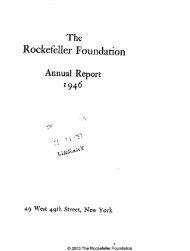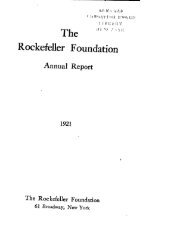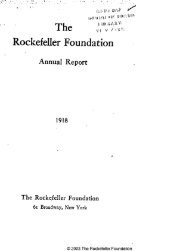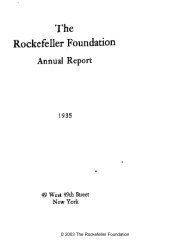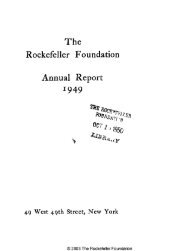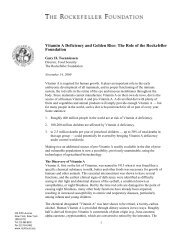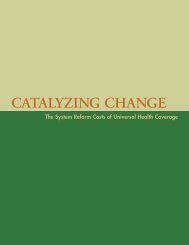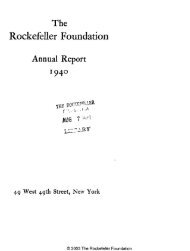Strong Ministries for Strong Health Systems - The Rockefeller
Strong Ministries for Strong Health Systems - The Rockefeller
Strong Ministries for Strong Health Systems - The Rockefeller
Create successful ePaper yourself
Turn your PDF publications into a flip-book with our unique Google optimized e-Paper software.
Building country networks of <strong>Health</strong> Resource Partner Institutions (HRPI)<br />
Throughout the interviews, ministers and stakeholders noted the importance of organizations outside of government that can<br />
provide needed expertise and resources to ministries of health. Every country needs to cultivate and grow a critical mass of<br />
individuals, groups, and institutions that interact regularly among themselves and with their governments, parliaments, and civil<br />
society as agents of change, holding each other and their governments to account, as well as providing support. Networking<br />
among in-country players will be essential to promote cross learning and support. <strong>The</strong>se “<strong>Health</strong> Resource Partner Institutions”<br />
(HRPI) will vary by country, but would include universities, professional associations, national academies of medicine and<br />
science, freestanding think tanks, research and development organizations, national management institutes, business, the<br />
media, and certain NGOs, all of which can work with ministries and political leaders to create a culture that produces and uses<br />
evidence-based policy and programs <strong>for</strong> health.<br />
While such institutions are common and strong in certain countries (and used effectively by ministries of health), they are<br />
missing or rare in others, or those that do exist may not be strong in areas of expertise relating to stewardship and governance<br />
by ministries of health. In addition, governments and ministries of health are sometimes insular and reluctant to collaborate with<br />
HRPIs. Other government agencies, as well as regional and international organizations, can and do play supportive roles to<br />
ministries of health, and these partnerships should be nurtured.<br />
RECOMMENDATION 3<br />
Country Networks of Expertise<br />
Countries should develop effective governmental and non-governmental “<strong>Health</strong> Resource Partner Institutions”<br />
(HRPI) to support the health system stewardship and governance functions of the ministry of health.<br />
Organizations outside government can, and in low- and middle-income countries must, provide needed expertise<br />
to ministries of health. In many countries, these organizations themselves will need to be strengthened to provide<br />
the level of intellectual and human resources necessary <strong>for</strong> effective health system per<strong>for</strong>mance and governance.<br />
A protocol or framework should be developed to guide the mapping of other governmental agencies and nongovernmental<br />
organizations with the capacity or potential to serve as HRPIs <strong>for</strong> ministries of health at country<br />
level. Such a protocol or framework should include agreed upon definitions of the categories of institutions, and<br />
a process <strong>for</strong> gathering in<strong>for</strong>mation on the resources and relationships HRPIs have, or could provide to ministries.<br />
Once these are known and needs are identified, action plans can be developed to strengthen the various partners<br />
and enhance their links to the ministries and each other.<br />
Regional actions<br />
As discussed above, there is a critical need <strong>for</strong> a network of diverse in-country stakeholders and institutions, both within<br />
and outside government, to provide expertise and support to the ministries of health. This study also identified a role <strong>for</strong><br />
regional mechanisms to champion the stewardship function of health systems strengthening, and to support the development<br />
and networking of HRPIs with ministries of health at country and regional levels.<br />
African Union <strong>Health</strong> Ministers in two consecutive conferences6 have called <strong>for</strong> campaigns to strengthen the implementation<br />
capacity of ministries of health, a sentiment that was also echoed in the last World <strong>Health</strong> Assembly resolution on<br />
Primary <strong>Health</strong> Care.<br />
During the discussions and consultations over the course of this study and in the recent African consultation on the final report,<br />
there was wide ranging support <strong>for</strong> the concept and mission of a pan-African regional mechanism, with ACHEST leading the<br />
development ef<strong>for</strong>t and serving as the secretariat <strong>for</strong> the network. <strong>The</strong> establishment of an “African <strong>Health</strong> <strong>Systems</strong> Governance<br />
Network” (ASHGovNET) can serve as a potential prototype <strong>for</strong> such ef<strong>for</strong>ts in other regions of the world as appropriate.<br />
ACHEST has already taken the first steps toward operationalizing the ASHGovNET by convening a regional consultation at<br />
the end of 2009 in Uganda with broad participation from African organizations and global organizations that provide leadership<br />
development and health systems strengthening services to countries in the region. Included were: representatives of<br />
6. Addis Ababa Declaration on the 4th Session of the AU Conference of Ministers of <strong>Health</strong> (CAMH4); Africa <strong>Health</strong> Strategy 2007 – 2015. Website addresses <strong>for</strong> reports of<br />
these conferences are provided in Appendix 1.<br />
22 <strong>Strong</strong> <strong>Ministries</strong> <strong>for</strong> <strong>Strong</strong> <strong>Health</strong> <strong>Systems</strong>



